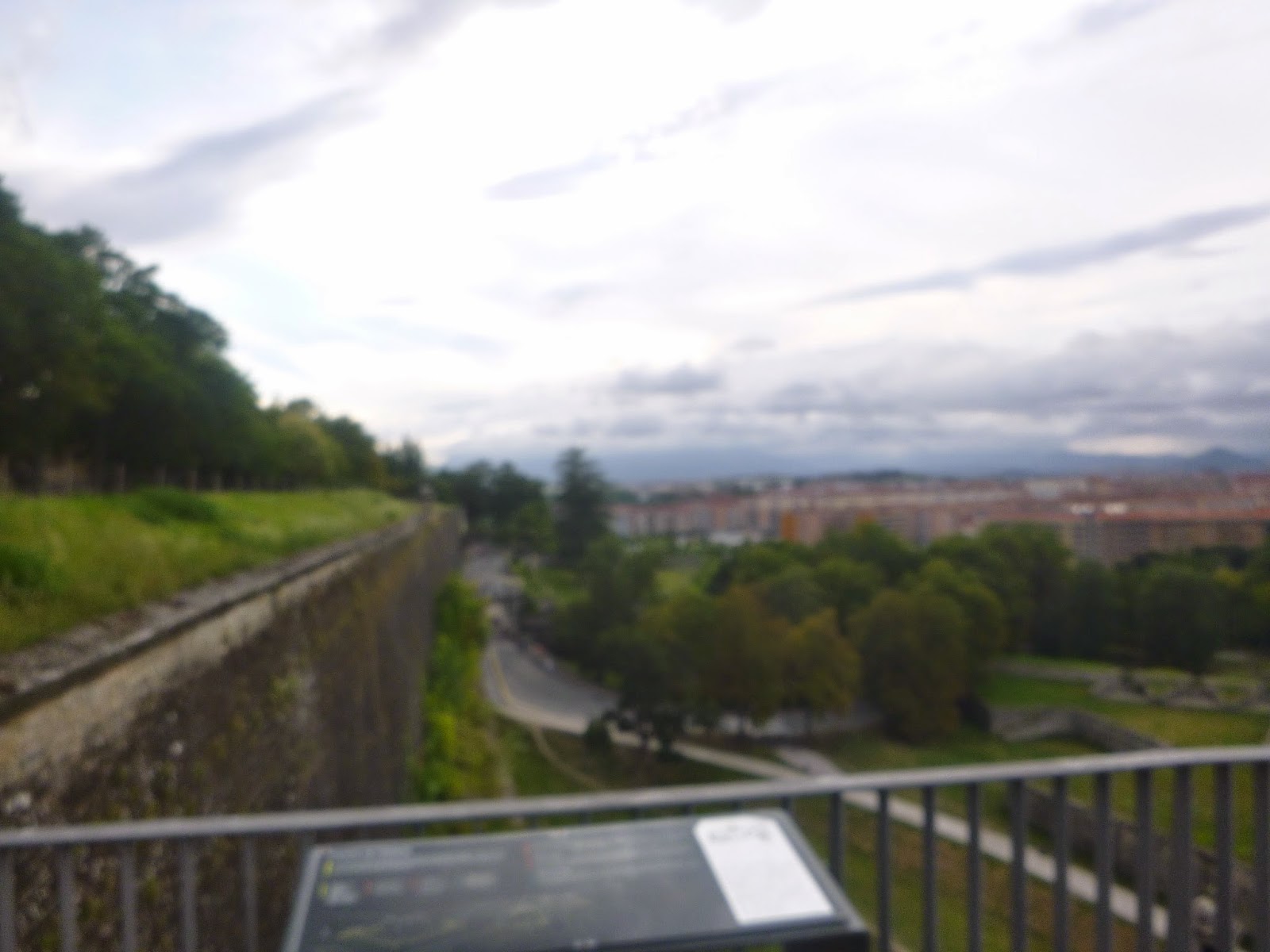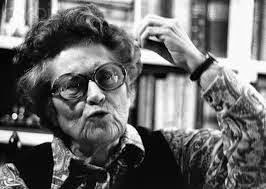 |
| Images of Cervantes, Papa Hemingway in Pamploaa, a map, and ghosts of Spain - my constant companions as we hiked from Pamploaa to Logrono. |
Our journey through Spain would begin in Irunea, as explained in the last log. We grabbed the 3:55 to Pamplona, reading along the way about Pamplona and the history of Spain.
As Giles Tremont notes about Pamplona:
In A Walk in the Woods, Bill Bryson’s narrative of his walk
through the Appalachian trail, he suggests
that the story of his adventure comes down to seeing the
world on the ground and appreciating what
he has, what he sees, knows, feels and lives. It offers a pause to stop and be, to simplify
life to a walk, a breath of air, a moment to appreciate the body working as we
walk, to see the world in all its glories and gore in a certain perspective, but also as a pause button on life.
This is probably the message of every similar trail. We choose to walk or ride so we can see and
relish some of life’s small details.
This is why Benjamin’s explorations of Paris seem to telling. "Flâneur" is a word understood intuitively by the French to mean "stroller, idler, walker." We are all flâneurs on the trail.
This is why we got off the big highways and
onto the backroads when Will and I
drove from Texas to Louisiana to start this summer of journeys. You see more of the details. We found a taco spot which allowed us to
breathe and laugh after spreading Dad’s ashes.
It seems trivial, but this space offered us a respite from the storm of
our emotions, our lives, our Dad’s painful departure, and the Eudora Welty
Optimists Daughter Like storm of his departure.
The other lesson, of course,
is to see life, your life from a
different perspective. Driving from
Paris to Spain, we’ve talked about history.
History of course brought me here.
It brought us here, just like it brought the Shepard’s from Dorchester
England to Dorchestor Mass. In France,
we talked about "Liberty, Equality and Fraternity." Marx surmised the French revolution as a
failure. It went from Monarchy to a
brief liberal government back to a dictatorship with Napolean. Of course, that is a crude reading of French
history. A failure of my capacity to
recall Western Civilization class from first year in college, professor Koblic
at Pomona reading Palmer’s history no less, and my poor aptitude for history no
doubt. Oddly, I was obsessed with Weimar
and German history, ignoring the rest and leaving Mel Brook's History of the
World Part One and Broadway musicals, to teach me all I know about the French revolution. Still, a system of education and laws came out of the Napoleonic
epoch. So did a system of colonial rule
extending from Algeria to Viet Nam. And this
brings us back to seeing the US and our story.
The French looked with inspiration to our Revolution of 1776, lending us
a hand in unshackling us from the British Empire. And then they borrowed a page, starting a
revolution of their own a dozen years
later in 1789. We owe each other a lot,
even though the two countries seem to generally hate each other as we’ve done
since 1945 and the liberation of Paris from the Nazis. Apparently, no one could agree on who should
lead the parade. And the two old friends
started bickering and we’ve continued to do so, while misunderstanding or
reading each other’s histories. A
century after supporting the US in its own anti imperial war, France was busy
creating its own empire. And just as it
was pulling our of its colonial entanglements in Algeria and Viet Nam, the US
was busy stepping into this void, becoming lost losing its own soul in Viet
Nam. Charles De Gaulle famously warned LBJ
to stay clear of that mess. We all know how that went.
And of course, when the Spanish arms were finally losing
some of their colonial grip on the Caribbean, the US moved into that void in
1898 taking control of the Eastern most outpost in Puerto Rico, whose Capital
is still full of Spanish restaurants, the colonial legacy still lingering as
the gringos stroll about.
Back to Spain for a second.
On the train, I thought about why we came here. Number two was busy writing in her journal. So I wrote a dedication to her, writing
inside about how honored I have been to walk through these streets with her,
tracing her first steps through these parts with her. I hope she can continue chasing dreams and
windmills her whole life.
SO what really brought us here – Cervantes, Marquez, and
Vargas Llosa.
Some of my favorite writers, Cervantes showed us what daydreaming could mean for living, for story telling, and make believe. Marquez and Vargas Ilosa, the greatest living Spanish writers, built on this trajectory, teaching us what a story about a text within a text, a dream within an empire, a fantasy within a captive land, a free imagination could live and be – if only we could allow ourselves to see it and revel in it. Marquez, who just died, reminded us not to look at Latin America and its colonial legacies from the eyes of the West, with the yard stick of positivism. We would misread the story if we looked at it this way. For a while there as the boom in Latin American fiction exploded, both Vargas Ilosa and Marquez lived here in Spain.
 |
| Cervantes, Marquez and Mario Vargas Llosa - the masters who brought us a surreal new world, even if the latter two did bicker from time to time. |
Some of my favorite writers, Cervantes showed us what daydreaming could mean for living, for story telling, and make believe. Marquez and Vargas Ilosa, the greatest living Spanish writers, built on this trajectory, teaching us what a story about a text within a text, a dream within an empire, a fantasy within a captive land, a free imagination could live and be – if only we could allow ourselves to see it and revel in it. Marquez, who just died, reminded us not to look at Latin America and its colonial legacies from the eyes of the West, with the yard stick of positivism. We would misread the story if we looked at it this way. For a while there as the boom in Latin American fiction exploded, both Vargas Ilosa and Marquez lived here in Spain.
 |
| The Free-Women-of-Spain. |
I love walking through Spain and imagining the streets from
the eyes of the writers – Hemmingway, Marquez, and Vargas Llosa, the painters –
Vasquez, the anarchists – Montseny, the Free Women of Spain, the summit
hopping anarchists who brought a pop flair to the global justice confabs from
Prague to New York City, Seattle to Cancun.
I still have my New Kids on the Black Block t-shirt one gave me during the
world economic forum action back home in 2002.
They were sweet and fun, and ready to rumble in the streets. You can see their crew here on the streets of
Pamplona, the vagabonds, pilgrims, and graffiti artists whose work compliments
this lovely city full of open plazas where people eat and drink and hang out for hours and hours.
Sitting here in Spain, I am catching up for lost connections
I was not able to make two and a half decades ago when I first romped around
Europe as the cold war ended. Instead of
going to Ibiza I traveled north and had my own adventures as the August coup
and the final gasps of the Soviet Union crumbled, sending final shudders
through a jittery Berlin once again.
But I was also reading that whole trip, page after page of
magic realism, Carlos Fuentos on the train from Rome to Florence. Fuentes helped launch Marquez’ early
career. I read Vargas Llosa on those
trains. And now here I am in one of their
romping grounds, making sense of the home base for the beauties and tragedies
of the colonial empire which would forever transform capitalism, imperialism,
and culture, sending its language, religion, disease, economic models, trade,
exploitation of natural resources, and people.
"Whenever you see a beautiful church in Spain, they don't you where they got gold to put inside," noted a colleague of mine at our college.
Out this mix, we have a modern world where Spanish is spoken around the world.
"Whenever you see a beautiful church in Spain, they don't you where they got gold to put inside," noted a colleague of mine at our college.
Out this mix, we have a modern world where Spanish is spoken around the world.
And people come back her to walk a pilgrimage to St James that I began last winter when we walked to the Metropolitan Museum and first saw the image of St James there.
Our walk from Pamplona to Zariquegui starts in a few
hours. Its too exciting to sleep. But I
probably ought to. It connects me with a history of where we’ve
been in the US with Puerto Rico, Latin America, Spain and the Magical Realist
narratives which changed my life, pushing me toward a magical activism, and ludic, surreal way of seeing and being in the wold.


























































































No comments:
Post a Comment